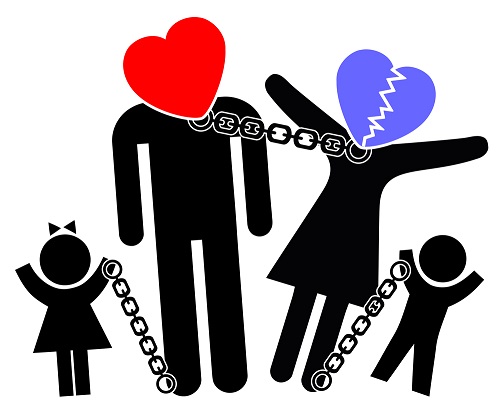Imaginary Roles We Play
Within “dysfunctional” families, there are several roles that typically emerge. No one signs up for these. Individuals just move into them during the course of life in this family. And usually in an attempt to emotionally survive the toxic environment. Metaphorically, every member of a shame-based, dysfunctional system will do whatever necessary to exert his or her influence to restore normalcy back to the system. Consider these most common roles:

- Dependent. This individual is the one whom every other family member “dances” around. They are “dependent” on everyone else participating in their game, even though they may be the only one not aware that a game is even being played. They may be addicted, alcoholic, suffering from PTSD, angry, abusive, workaholic, manipulative, or just very strong-willed. They may be a parent or stepparent, or sometimes even a child. Regardless, they are the center point and creator of the emotional life of the entire home and family. Their life is motivated largely by a sense of shame and inadequacy. They tend to live in denial of the seriousness of their problem, denial of the impact their problems inflict on members of the family system, and denial of the inevitable downward course of their own lives and relationships.
- Enabler. A key member of the dependent’s immediate family usually undertakes this role. Also sometimes referred to as the caretaker or rescuer, the enabler feels compelled to try, at all costs, to decrease the chaos and fear the dependent is producing. However, in doing so, this individual only helps perpetuate the dysfunction. Without the enabler, it would be difficult, if not impossible, for the dependent to continue in their role. There are four typical patterns enablers employ in an effort to cope with and control the behaviors of the dependent. The “sufferer” may suffer from many ailments, taking on the role of a victim or martyr, hoping to change the dependent’s behavior by showing how much they are being hurt by them. The “punisher” may try to change the dependent by making their life absolutely miserable. The “controller” attempts to control the dependent’s shaming behaviors by monitoring, supervising, and controlling every aspect of the dependent’s life. And the “waverer” seems to ride a roller coaster in their relationship with the dependent: one moment attempting to control or force the dependent to change, then the very next moment totally giving up due to exhaustion in trying to bring about change.
- Family Hero. This is the individual who believes that somehow, directly or indirectly, he or she is responsible for the dependent’s situation. By achieving, in whatever form, this individual believes they may help reverse the problems and make the dependent feel better (or love them, or come back home, or whatever). The characteristic behavior of this family member is overachievement.
- Scapegoat. The scapegoat in the shame-based family feels damaged or inferior, often recalling experiences of having been victimized or disadvantaged by other family members. Because of this, this person may decide that attention for being “bad” is better than no attention at all. The scapegoat’s defense against emotional pain is in the form of substitution. This person will substitute almost anything that can be found as relief for the pain of believing they’re “a loser,” regardless how unhealthy that choice may be.
- Lost Child. This family member withdraws from the family in a quiet way, but not in an openly defiant way as the scapegoat does.Loneliness is the most common feeling of the lost child, who is often quiet and passive. This individual is willing to “go with the flow” as a result of their feelings of powerlessness. They will resort to emotional and physical retreat as a defense against the painful events occurring in the home. They tend to create their own little world where tranquility can be enforced.
- Mascot. The mascot is the family clown or joker. They fear that the chaos at home will suddenly reach a boiling point and explode, the thought of which scares them to death. This uneasiness causes them to use humor and superficiality as a diversion to cheer up the dreary and depressing atmosphere. When carried into adulthood, this often results in emotional immaturity. They are loved by all but known by none!
- Golden Child. This individual is often found within families who have a parent or parents with narcissistic tendencies. The narcissist will tend to favor this child, as they represent all of the characteristics that parent loves about themselves. Despite being the “favorite,” this child has difficulty finding their own identity separate from that of the narcissistic parent. They also may relate to others in the home in ways similar to the parent, in order to be seen on the “correct side” of situations.
——–
Soul health and spiritual maturity cannot be separated. Our counselors are ordained Christian ministers as well as certified and licensed Christian counselors. We are able to help you experience freedom from shame, anxiety, depression, or marriage / relationship conflict with methods that are purely Christ-centered. Please click on this link to learn much more about how our CHRISTIAN COUNSELING Can help you become a more authentic follower of Christ, and help you find freedom from identity dependence.https://lifetrainingcounseling.org/
Life Training offers convenient sessions at https://lifetrainingcounseling.org/depression-counseling/our office in Louisville, Kentucky, as well as online counseling via Zoom or FaceTime. Our non-profit counseling practice has had an outstanding track record from over a decade helping men and women, individuals and couples who are ready to move beyond anxiety, depression, and conflicts in marriage or other relationships find hope and healing in their lives. Contact us today at 502-717-5433, or by email at drdave@lifetrainingcounseling.org
